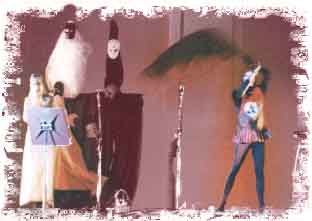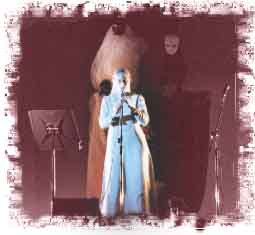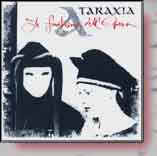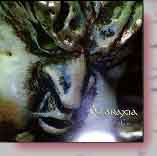

As some of you might recall, in the previous issue I mentioned that if all went well, I would have an interview with Ataraxia on this issue. Well, things went far, far better than what I expected as I had the pleasure of watching this brilliant Italian act perform here on Lusitanian ground last May and hence could not afford to miss the oportunity of having a quick chat with Francesca Nicoli, Ataraxia's singing muse...
(A small excerpt from the interview featured in full on Dark Oath #6)
What does working in a project such as Ataraxia mean to you? Is this your way to escape reality for a few moments or rather the way to give reality an alternative interpretation?
• Yes, to give reality an alternative interpretation. Because we live in a society that is stifling, it's almost the same and the only things that are important in our life, so we are looking for the same spirit that we had in the middle-ages, we are looking for an inner dimension to live better.
You have collaborated with a few other projects as well, such as Monumentum and Camerata Mediolanense. How did that came up?
• I know Roberto from Monumentum and he has also produced one of our releases, he is a wonderful person and we have a lot of things in common. I love their music and I will perhaps be singing on their forthcoming album too. Camerata Mediolanense are friends of mine, we have a common love for ancient music, so we work together to approach middle age music in Italian.
• I don't feel bothered, I feel well. Perfectly well. In Italy, things are changing. A lot of people connected to Classical music are coming to our concerts, so we have a different public now, and also surprisingly in the last years, in the Metal scene we've been having a lot of friends and fans.
Ataraxia's musical frame dates back to a few centuries ago and perhaps even more so on your last album, what lead you to choose this musical concept for the work of Ataraxia?
• Yes, the Baroque period... We have approached the Middle Ages before and then Renaissance, and now the Baroque age because we wanted to have a dire contact with all the ages important for music and the Baroque age has been very important for Italian music because the musicians were free, completely free to create and compose what they felt to do. It was not a popular kind of music, but it was an interesting thing to approach, such a difficult kind of technical and emotional music.
You seem to be strongly attracted to water, why is that so? Is this perhaps connected to the constant rebirth that water represents?
• Yes, it's possible. I don't know why, but the first time that I was to Greece I was really attracted by water, I thought that going down and drowning in the water would be the best way to die. I don't know why, but...
 We are now only a couple of years away from the turn of the century, which is believed to bring drastic events upon mankind, perhaps much like what happened to Atlantis! Do you think we'll share the same fate than the civilization of Atlantis? Some thoughts on this subject would be a nice way to end this interview...
We are now only a couple of years away from the turn of the century, which is believed to bring drastic events upon mankind, perhaps much like what happened to Atlantis! Do you think we'll share the same fate than the civilization of Atlantis? Some thoughts on this subject would be a nice way to end this interview...• Yes, hopefully I think so. (laughs) Not in the next 2 or 3 years, but in the next 10, 20 or 30 years or so.
|
Ataraxia c/o Vittorio Vandelli Via Popoli, 4 41057 SPILAMBERTO (MODENA) - Italy - |
• Ataraxia "Le Fantasma dell'Opera"
CD 1996 Avantgarde Music • 12 songs, 46'
 Ataraxia's very own interpretation of the Phantom of the Opera. Boldly symphonic, with strong timpani percussions and other rich orchestrations that provide Ataraxia with a strength that they had not met before, the album holds a dramatic and operatic nuance on its opening couple of songs up until 'La Nova Margherita', a surprising remake of Kate Bush's 'Wuthering Heights'. Footsteps... The twinkling guitar strings and drifting spacy synths of 'Le Palco n. 5' take you through magic and at times bleak avenues, a passage that will lead you into the intimate and melancholic Baroque Neo-Classicism of 'Le Violino Incatato', crafted by swirling acoustic guitar work and the appropriate dreamy keyboard backup. The music is now light hearted, serene and soothing, it moves gently and gracefully, deprived of the orchestral ardor and instead using it to add an extra depth to the sad ambiance. 'Faust in una Sala Maledetta''s piano lines and Franscesca's various vocal tones entwine and often raise a somewhat ghostly ambiance as wickedly high pitched singing and choirs coil around strong grave notes or soprano work. 'Al Balle Mascherato' brings back the strong orchestrations evoking the mood of XVIIIth century royal festivities and balls. 'La Lira di Apollo' delves back into sad depths - introspective and shy acoustic guitars laced with cadenced percussions, flute melodies and male spoken vocals combined with Franscesca's mournful chanting and after 'Il Signore Delle Botolf', an acoustic instrumental, on 'Nei Sotterranea Dell'Opera' Ataraxia tread icy cold realms and catacombs where ghostly wails echo through walls of spiraling and shimmering sounds and church organ scenarios. The album folds with yet another couple of melancholic acoustic ballads, 'Le Ore Rosa di Mazenderan' and 'Fine Degli Amore Del Mostro', a mournfully sung, yet wordless, piece. The audience would applause, but I suppose they are too impressed to move.
Ataraxia's very own interpretation of the Phantom of the Opera. Boldly symphonic, with strong timpani percussions and other rich orchestrations that provide Ataraxia with a strength that they had not met before, the album holds a dramatic and operatic nuance on its opening couple of songs up until 'La Nova Margherita', a surprising remake of Kate Bush's 'Wuthering Heights'. Footsteps... The twinkling guitar strings and drifting spacy synths of 'Le Palco n. 5' take you through magic and at times bleak avenues, a passage that will lead you into the intimate and melancholic Baroque Neo-Classicism of 'Le Violino Incatato', crafted by swirling acoustic guitar work and the appropriate dreamy keyboard backup. The music is now light hearted, serene and soothing, it moves gently and gracefully, deprived of the orchestral ardor and instead using it to add an extra depth to the sad ambiance. 'Faust in una Sala Maledetta''s piano lines and Franscesca's various vocal tones entwine and often raise a somewhat ghostly ambiance as wickedly high pitched singing and choirs coil around strong grave notes or soprano work. 'Al Balle Mascherato' brings back the strong orchestrations evoking the mood of XVIIIth century royal festivities and balls. 'La Lira di Apollo' delves back into sad depths - introspective and shy acoustic guitars laced with cadenced percussions, flute melodies and male spoken vocals combined with Franscesca's mournful chanting and after 'Il Signore Delle Botolf', an acoustic instrumental, on 'Nei Sotterranea Dell'Opera' Ataraxia tread icy cold realms and catacombs where ghostly wails echo through walls of spiraling and shimmering sounds and church organ scenarios. The album folds with yet another couple of melancholic acoustic ballads, 'Le Ore Rosa di Mazenderan' and 'Fine Degli Amore Del Mostro', a mournfully sung, yet wordless, piece. The audience would applause, but I suppose they are too impressed to move.
• Ataraxia "Concerto n. 6: A Baroque Plaisanterie"
CD 1996 Apollyon • 15 songs, 50'
 "Concerto n. 6..." is perhaps one of Ataraxia's most 'intimate' works and most certainly the most homogeneous of all the ones that I know (by this I mean that there is less variation genre-wise from song to song than what one is used to find in their other albums). A relaxing scenario is created by smooth string layers and acoustic uitar melodies. Most of it revolves around Baroque musical structures and moods - the way the guitar harmonies swirl, the semi-ecclesiastical tone that some of the songs evoke and the sad and lonely essence that the music offers. It became my favorite listen for many a summer night spent alone as I stood by my window and allowed my mind to drift away to the music. Glances of a festive celebrations take form every now and then and clash with the picking of the guitar strings that draws a light gloom to the music. 'Notturno: Belle Rose Porporine' combines gentle orchestrations into a delicate yet epic piece topped by Franscesca's soaring voice. 'Gagliarda: Astore Serotina' and 'Arioso' hold a triumphant and noble stand again provided by fine orchestral work. On 'Madrigale', an accapella piece, Franscesca comes to surprise us again with the way she manages to control her vocals. Enveloping acoustic melodies and discreet back-up offered by harpsichord, flute, drifting strings and cello arrangements combine on 'Gavotta', a piece which seems to have a lighthearted innocence and purity. 'Forlane' uses a similar formula and clever combinations between high pitched operatic vocals and strong lower tones, yet turns out most of all serene and delicate. The last four tracks on the album were recorded live in the lounge of an Italian house of the XVIIth century. Again Ataraxia manage to evoke a feeling of solitude and melancholy but the music offers a warm caress that helps you bear those feelings. A certain passage on the album mentions that '...music exists only to express what is not possible to be expressed by words...'. I could not agree more and trying to put to words the beauty of Ataraxia's music turns out to be pretty much a worthless effort.
"Concerto n. 6..." is perhaps one of Ataraxia's most 'intimate' works and most certainly the most homogeneous of all the ones that I know (by this I mean that there is less variation genre-wise from song to song than what one is used to find in their other albums). A relaxing scenario is created by smooth string layers and acoustic uitar melodies. Most of it revolves around Baroque musical structures and moods - the way the guitar harmonies swirl, the semi-ecclesiastical tone that some of the songs evoke and the sad and lonely essence that the music offers. It became my favorite listen for many a summer night spent alone as I stood by my window and allowed my mind to drift away to the music. Glances of a festive celebrations take form every now and then and clash with the picking of the guitar strings that draws a light gloom to the music. 'Notturno: Belle Rose Porporine' combines gentle orchestrations into a delicate yet epic piece topped by Franscesca's soaring voice. 'Gagliarda: Astore Serotina' and 'Arioso' hold a triumphant and noble stand again provided by fine orchestral work. On 'Madrigale', an accapella piece, Franscesca comes to surprise us again with the way she manages to control her vocals. Enveloping acoustic melodies and discreet back-up offered by harpsichord, flute, drifting strings and cello arrangements combine on 'Gavotta', a piece which seems to have a lighthearted innocence and purity. 'Forlane' uses a similar formula and clever combinations between high pitched operatic vocals and strong lower tones, yet turns out most of all serene and delicate. The last four tracks on the album were recorded live in the lounge of an Italian house of the XVIIth century. Again Ataraxia manage to evoke a feeling of solitude and melancholy but the music offers a warm caress that helps you bear those feelings. A certain passage on the album mentions that '...music exists only to express what is not possible to be expressed by words...'. I could not agree more and trying to put to words the beauty of Ataraxia's music turns out to be pretty much a worthless effort.

Official Ataraxia Homepage